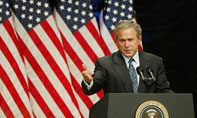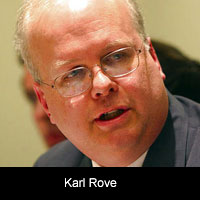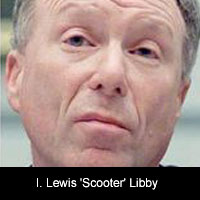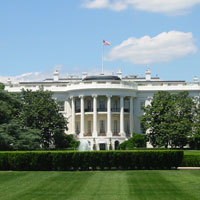- About Us
- Columns
- Letters
- Cartoons
- The Udder Limits
- Archives
- Ezy Reading Archive
- 2024 Cud Archives
- 2023 Cud Archives
- 2022 Cud Archives
- 2021 Cud Archives
- 2020 Cud Archives
- 2015-2019
- 2010-2014
- 2004-2009
 |
Slipping Past The Point of No Return? |
Almost twelve months ago I offered an overview of what we might expect to be some of the key issues that would dominate President Bush’s second term in office. Two in particular were cited. First, that Bush would attempt to unite a nation in which 55 million voters had preferred another man to be President, and that this might be critical as he looked to secure his legacy. Second, having nonetheless won the election with a clear mandate, Bush asserted that he now had ‘political capital’ and intended to use it, and most certainly his new leverage would be applied to such prevailing matters as Iraq and his goal of revamping the social security system.
 Today, while it is most important we remember that political fortunes can shift dramatically within but days, it is becoming plainly obvious that not only has Bush failed to unite a nation behind him, but many former supporters within his own party are now turning against him. Further, what ‘capital’ Bush did indeed hold in the aftermath of his election victory and the tragedy of 9-11 has, plainly, been misspent, misguided, and disappeared into a puff of scandal and smoke that may, in the end game, dominate any future assessment of his legacy and place in history.
Today, while it is most important we remember that political fortunes can shift dramatically within but days, it is becoming plainly obvious that not only has Bush failed to unite a nation behind him, but many former supporters within his own party are now turning against him. Further, what ‘capital’ Bush did indeed hold in the aftermath of his election victory and the tragedy of 9-11 has, plainly, been misspent, misguided, and disappeared into a puff of scandal and smoke that may, in the end game, dominate any future assessment of his legacy and place in history.
The current crisis within the White House –and make no mistake of it, this is certainly a period of real crisis- is the culmination of a series of events, some of which, to be fair, were not of the current administration’s direct doing, but others which cannot be interpreted as anything other than the product of utter bungling and arrogance.
 The ongoing difficulties of the Bush administration to secure stability in Iraq and also offer a clear plan for withdrawal as troop deaths recently passed two thousand in number has certainly been the most damaging issue at hand for the administration. The anti-war movement had a ‘good summer’, and their adopted leader Cindy Sheehan received widespread coverage and support against the conflict, even if her rally-cry demands to ‘bring the troops home NOW’ are unfortunately a tad misguided with regard to practical realities and responsibilities. Irrelevant of one’s original support for or against this war, it is critical the U.S government at least find as close to workable a solution there now that they’re on the ground in Iraq, and an immediate, hasty withdrawal would almost certainly only result in a protracted, bloody civil war. While finding that ‘workable solution’ is no easy task, any expression of at least some sort of formulated plan for Iraqi stability and troop withdrawal would have to be better than Bush’s current assurances that, at an estimated cost of over $5 billion a month, America will overstretch their military, forgo the use of such funds for domestic and other improvement, burden future generations and administrations with the debts of this endeavour, and simply, vaguely, ‘stay the course’ in Iraq for ‘as long as it takes’.
The ongoing difficulties of the Bush administration to secure stability in Iraq and also offer a clear plan for withdrawal as troop deaths recently passed two thousand in number has certainly been the most damaging issue at hand for the administration. The anti-war movement had a ‘good summer’, and their adopted leader Cindy Sheehan received widespread coverage and support against the conflict, even if her rally-cry demands to ‘bring the troops home NOW’ are unfortunately a tad misguided with regard to practical realities and responsibilities. Irrelevant of one’s original support for or against this war, it is critical the U.S government at least find as close to workable a solution there now that they’re on the ground in Iraq, and an immediate, hasty withdrawal would almost certainly only result in a protracted, bloody civil war. While finding that ‘workable solution’ is no easy task, any expression of at least some sort of formulated plan for Iraqi stability and troop withdrawal would have to be better than Bush’s current assurances that, at an estimated cost of over $5 billion a month, America will overstretch their military, forgo the use of such funds for domestic and other improvement, burden future generations and administrations with the debts of this endeavour, and simply, vaguely, ‘stay the course’ in Iraq for ‘as long as it takes’.
But if the Iraq conflict had been a consistent source of anguish for George Bush, Hurricane Katrina was the crisis that pushed the administration over the edge and to this current, dramatic freefall into the political abyss. Few can blame Bush for the hurricane itself, though Robert Kennedy Jr. certainly alluded to Bush’s environmental policies perhaps coming back to haunt him, and the administration had received more than enough advance warning about the risk of New Orleans’ levees breaching. But the aftermath of the tragedy exposed raw a lack of real domestic preparedness and competency for effective relief and restructuring in the event of tragedy that had merely, as many agencies and independent bodies earlier warned, been propped up consistently by hot air assurances of readiness and more of those ‘old pal’ loyalty appointments of inexperienced incompetents like FEMA chief Michael Brown for which Bush is now becoming alarmingly famous.
 While Barbara Bush chuckled about how things were working out ‘very well’ for the victims recovering from Katrina huddled in the Houston Astrodome, the tragedy also highlighted a significant economic and racial divide between classes in her son’s corporate-fuelled America. Increasingly, citizens began to wonder aloud how it was that their nation had invested so many troops and millions in conflicts abroad when they were unable to make haste in rescuing their own residents at home.
While Barbara Bush chuckled about how things were working out ‘very well’ for the victims recovering from Katrina huddled in the Houston Astrodome, the tragedy also highlighted a significant economic and racial divide between classes in her son’s corporate-fuelled America. Increasingly, citizens began to wonder aloud how it was that their nation had invested so many troops and millions in conflicts abroad when they were unable to make haste in rescuing their own residents at home.
Indeed the large sum of President Bush’s domestic efforts has fallen short. His enthusiastically touted social security reform is seemingly a dead issue, forgotten in the ether of Democratic and Republican concerns several months ago. In 2000 Bush and Cheney campaigned with promises of implementing an energy plan to lower gasoline prices, and yet Americans are now paying more for petrol than at any other time in their history, and are still dependent on the Middle East for supplies despite the risky potential consequences of such a reliance (see: the motivations behind the current Iraq War). This, despite increasing consumer demands of their government for hybrid vehicles and alternative fuel sources.
 It was quite remarkable, then, that with the heat from Hurricane Katrina still in full burn, Bush felt he had enough political capital left to push through his nomination of yet another blatantly ‘pal appointment’ and an individual who hadnever once held a judicial appointment to a position on the Supreme Court. While we can almost feel sorry for the severe personal battering Harriet Miers received, it was, truthfully, fairly deserved because Bush shouldn’t have expected anything less for a candidate of this pedigree. The nomination was so overwhelmingly ludicrous and politically damaging that it fractured the Republican party and did more to reveal the true nature of the Bush Presidency than perhaps anything else in his five years thus far in charge of the nation. The nomination at such a critical period of instability for the administration, under attack from all corners, suggested the only possible conclusion one could reach was that George Bush is completely insulated and shielded by his advisors and inner circle from political and practical realities, and along with Dick Cheney, Karl Rove, and Donald Rumsfeld possesses a level of stubborn ego and arrogance that would rather risk bringing down the White House before concessions might ever be made to move forward.
It was quite remarkable, then, that with the heat from Hurricane Katrina still in full burn, Bush felt he had enough political capital left to push through his nomination of yet another blatantly ‘pal appointment’ and an individual who hadnever once held a judicial appointment to a position on the Supreme Court. While we can almost feel sorry for the severe personal battering Harriet Miers received, it was, truthfully, fairly deserved because Bush shouldn’t have expected anything less for a candidate of this pedigree. The nomination was so overwhelmingly ludicrous and politically damaging that it fractured the Republican party and did more to reveal the true nature of the Bush Presidency than perhaps anything else in his five years thus far in charge of the nation. The nomination at such a critical period of instability for the administration, under attack from all corners, suggested the only possible conclusion one could reach was that George Bush is completely insulated and shielded by his advisors and inner circle from political and practical realities, and along with Dick Cheney, Karl Rove, and Donald Rumsfeld possesses a level of stubborn ego and arrogance that would rather risk bringing down the White House before concessions might ever be made to move forward.
Yet beyond the already existing crises within the Republican party, including Tom DeLay’s indictment on conspiracy and money laundering charges, and accusations of insider trading against the Senate majority leader Bill Frist, none may end up being as politically damaging as the indictment of I. Lewis ‘Scooter’ Libby, Vice President Cheney’s chief of staff, and the first White House aide indicted in 130 years. Already, by such a precedent, Bush must know that this will taint his Presidency in years to come regardless of the outcome. Charged with lying to federal investigators and the grand jury, the indictment of course stems from the controversial leak of CIA spy Valerie Plame’s name that it has been suggested was something of a vendetta response from within the White House for her husband, former diplomat Joseph C. Wilson’s role in exposing exaggerations of pre-Iraq War intelligence. That this indictment will likely go to trial and therefore provide an ongoing, protracted spotlight into the actions of Bush’s inner sanctum (especially Rove and Cheney), as well as of the original reasons presented by the government for war, means that this issue is sure to dog the administration for some time.
 In a display of chutzpah that has been sorely absent in recent months, on November 1st Democrats forced the Republican-controlled Senate into an unusual closed session so as to call into question this pre-War intelligence and the lack of a long-promised congressional inquiry into the issue. Though dismissed as a mere stunt by Republicans, the act was telling of the renewed momentum many Democrats feel they have now gathered. With the long, dark shadow of brutalities committed at Abu Ghraib, Guantanamo and elsewhere rallying international concerns about America’s recent human rights record, the White House was again forced into damage control a few days later when the Washington Post published an article about CIA-run so-called ‘black sites’ operating around the globe since 9-11 involving secret, extra-legal prisons within which torture methods have been allowed as part of America’s ongoing ‘war on terror’.
In a display of chutzpah that has been sorely absent in recent months, on November 1st Democrats forced the Republican-controlled Senate into an unusual closed session so as to call into question this pre-War intelligence and the lack of a long-promised congressional inquiry into the issue. Though dismissed as a mere stunt by Republicans, the act was telling of the renewed momentum many Democrats feel they have now gathered. With the long, dark shadow of brutalities committed at Abu Ghraib, Guantanamo and elsewhere rallying international concerns about America’s recent human rights record, the White House was again forced into damage control a few days later when the Washington Post published an article about CIA-run so-called ‘black sites’ operating around the globe since 9-11 involving secret, extra-legal prisons within which torture methods have been allowed as part of America’s ongoing ‘war on terror’.
Polls now indicate that over 60% of the nation disapproves of President George Bush, and in off-year elections held on the 8th of November Republicans suffered key losses in Virginia (where Bush himself had campaigned) and New Jersey (where a scandal ridden Democrat was still preferred to the Republican alternative). But the White Housestill continues to maddeningly steer their ship in the face of common political sense. Despite the already existing calamity, and despite the fact President Bush has declared of the United States, ‘we do not torture’, Vice-President Cheney is reportedlyfighting anti-torture legislation that Democrat and Republican senators alike, defying the White House, voted overwhelmingly in support of at a count of 90-9. For Cheney to go out on this kind of limb at such a time, especially when actual war veterans like John McCain from within his own party have personal experiences with torture is indicative, surely, of how much the White House has lost touch.
 If even Republicans are privately conceding that their leadership has lost its way, and are tiring of the constant savage personal attacks and defensiveness they feel has been an unofficial internal White House policy at a cost to progress for so long, then consider the impact recent months have had on the American public, as indicated in the polls. Bush’s almost snake-oil-charm mix of swagger, assurance, and macho contempt for the opposition is no longer being bought by a citizenry who are growing wise to plays of rhetoric and cliché. They are becoming fully aware of just how severely their nation’s reputation has fallen in the eyes of the rest of the world, and a sense of disgust and shame is creeping in to replace national pride. Many now fear the haunting images of American choppers on rooftops in Saigon will be replayed on the skylines of Baghdad.
If even Republicans are privately conceding that their leadership has lost its way, and are tiring of the constant savage personal attacks and defensiveness they feel has been an unofficial internal White House policy at a cost to progress for so long, then consider the impact recent months have had on the American public, as indicated in the polls. Bush’s almost snake-oil-charm mix of swagger, assurance, and macho contempt for the opposition is no longer being bought by a citizenry who are growing wise to plays of rhetoric and cliché. They are becoming fully aware of just how severely their nation’s reputation has fallen in the eyes of the rest of the world, and a sense of disgust and shame is creeping in to replace national pride. Many now fear the haunting images of American choppers on rooftops in Saigon will be replayed on the skylines of Baghdad.
But George Bush still has time to try and recover, though it will now be against insurmountable odds, such is the extent of damage already done. It will be interesting to see what direction he takes, for we can be assured, repairing the situation is foremost on his mind. Changes will have to be made, and perhaps, in direct opposition to Bush’s own core values and character, he will have to make a concerted shift in policy and expression and offer a concession of his own mistakes and failings that the public might recognise some of that honesty they believe has gone missing from the White House for so long. Perhaps even a few of his closest allies and inner sanctum guardians will need to take a fall if he is to make his Lazarus return from the dead.
How much George Bush’s pride can be circumvented in the interests of recovery remains to be seen. While some would argue he couldn’t have ‘won’ in the situation either way, Bush’s failure to attend Rosa Parks’ recent funeral was telling. Here was a black woman of significant, historical importance, and yet Bush seemingly did not attend because he knew he would be booed (and apparently had a prior luncheon engagement with the Prince of Wales). But what more might it have told us of the mettle of the man and of his strength of character had he disregarded the risks and attended the funeral in the face of criticism? These are the kinds of limiting factors that may well continue to bury the Bush administration and taint their legacy in years to come.
